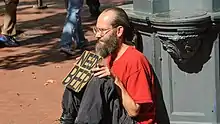Homelessness in Oregon
In 2016, a report from the Department of Housing and Urban Development (HUD) shows that the U.S. state of Oregon had an estimated homeless population of 13,238 with about 60.5% of these people still unsheltered.[1] In 2017, these numbers were even higher. As of January 2017, Oregon has an estimated 13,953 individuals experiencing homelessness. Of this homeless population, 1,083 are family households, 1,251 are veterans, 1,462 are unaccompanied young adults (aged 18–24), and 3,387 are individuals experiencing chronic homelessness.[2]
.jpg.webp)
Businesses have begun to make it known that they are not accepting the presence of homeless people around their businesses regardless of the circumstances these people are in.[3] Some of the complaints given are that homeless people 'scare customers away'; 'they are too noisy'; and 'they block the way' just to name a few complaints.[4][5] A city ordinance called 'sidewalk obstruction ordinance' was an ordinance which homeless advocates complained "criminalizes homelessness".[3] This was however, quashed by a judge's decision in 2009.[3] This decision left the police and business owners with disorderly conduct which the police chief said comes with the difficulty of proving intent and finding witnesses.[3]
Portland

In Portland, the local government took efforts in trying to become a zero-homeless city, which failed to meet its mission.[6] This is through a 10-year plan which they proposed in 2005 which states that they would move people into affordable housing rather than moving them to temporary shelters.[7]
Illegal camps have been growing in and around Portland since the beginning of COVID-19 pandemic. Some of those have become a public safety and health concerns.[8] One of the leading complaints about transient camps in Portland has been the used hypodermic needles on the ground which has been worsening as city suspended cleanups during the pandemic.[9] Businesses in Old Town Chinatown have voiced concerns about the increasing number of tents[8] A business owner and Old Town Chinatown neighborhood board member interviewed by The Oregonian said the number of tents have grown significantly since the pandemic and have heard from his customers that they don't feel comfortable visiting the area.[10]
Between 2013 and February 2019, the police department has seen a 60% increase in "unwanted person" complaints.[11] Homeless represent 3% of population while representing 52% of arrests.[12]
References
- Eastman, Janet (November 23, 2016). "Most of Oregon's homeless families live on the street, in cars, parks: Highest percentage in US., says HUD report". The Oregonian. Retrieved December 22, 2016.
- "Oregon Homelessness Statistics in 2017". U.S. Interagency Council on Homelessness.
- Mayer, James (July 15, 2009). "Portland grapples with homeless issue after ruling on sidewalk ordinance". The Oregonian. Retrieved December 18, 2016.
- Griffin, Anna (February 21, 2015). "Handling Panhandling". The Oregonian. Archived from the original on March 5, 2015. Retrieved December 24, 2016.
- Flaccus, Gillian (September 11, 2016). "Portland homeless crisis grows, creating dissent in tolerant Oregon city". Review Journal. Retrieved January 16, 2017.
- Griffin, Anna (2015-01-17). "Our Homeless Crisis: Successes of Portland's 10-year plan to end homelessness". oregonlive.com. Retrieved 2019-03-06.
Portland's 10-year plan to end chronic homelessness failed to fulfill its stated mission.
- Oregonian/OregonLive, Anna Griffin | The (2015-01-17). "Our homeless crisis". OregonLive.com. Retrieved 2019-03-06.
- Vinson, Ty (2020-07-22). "As coronavirus rages, Portland's homeless camps continue to grow". oregonlive. Retrieved 2020-08-03.
- Wood, Brian (2020-07-14). "Portland company keeps hypodermic needles out of landfills by recycling them". KATU. Retrieved 2020-08-06.
- Goldberg, Jamie (August 2, 2020). "Portland drafts plan to revive downtown, but business owners worry city is moving too slowly". oregonlive. Retrieved 2020-08-03.
- Shepard, Katie (February 6, 2019). "Portlanders Call 911 to Report "Unwanted" People More Than Any Other Reason. We Listened In". Willamette Week. Retrieved 2020-08-31.
- Smith, Anna V. (June 13, 2020). "There's already an alternative to calling the police". Mother Jones. Retrieved 2020-08-31.